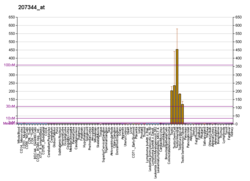From Wikipedia, the free encyclopedia
Protein-coding gene in humans
A-kinase anchor protein 3 is an enzyme that in humans is encoded by the AKAP3 gene .[ 5] [ 6] [ 7]
The A-kinase anchor proteins (AKAPs) are a group of structurally diverse proteins, which have the common function of binding to the regulatory subunit of protein kinase A (PKA) and confining the holoenzyme to discrete locations within the cell. This gene encodes a member of the AKAP family, and is expressed in testis only. The encoded protein contains an RII-binding domain, and is predicted to participate in protein-protein interactions with the R-subunit of the PKA. This protein is localized to the ribs of the fibrous sheath in the principal piece of the sperm tail. It may function as a regulator of both motility- and head-associated functions such as capacitation and the acrosome reaction.[ 7]
AKAP3 has been shown to interact with:
^ a b c GRCh38: Ensembl release 89: ENSG00000111254 – Ensembl , May 2017^ a b c GRCm38: Ensembl release 89: ENSMUSG00000030344 – Ensembl , May 2017^ "Human PubMed Reference:" . National Center for Biotechnology Information, U.S. National Library of Medicine .^ "Mouse PubMed Reference:" . National Center for Biotechnology Information, U.S. National Library of Medicine .^ Lefevre A, Duquenne C, Rousseau-Merck MF, Rogier E, Finaz C (May 1999). "Cloning and characterization of SOB1, a new testis-specific cDNA encoding a human sperm protein probably involved in oocyte recognition". Biochemical and Biophysical Research Communications . 259 (1): 60–6. doi :10.1006/bbrc.1999.0728 . PMID 10334916 . S2CID 15910199 . ^ a b Vijayaraghavan S, Liberty GA, Mohan J, Winfrey VP, Olson GE, Carr DW (May 1999). "Isolation and molecular characterization of AKAP110, a novel, sperm-specific protein kinase A-anchoring protein" . Molecular Endocrinology . 13 (5): 705–17. doi :10.1210/mend.13.5.0278 PMID 10319321 . ^ a b "Entrez Gene: AKAP3 A kinase (PRKA) anchor protein 3" .^ Brown PR, Miki K, Harper DB, Eddy EM (Jun 2003). "A-kinase anchoring protein 4 binding proteins in the fibrous sheath of the sperm flagellum" . Biology of Reproduction . 68 (6): 2241–8. doi :10.1095/biolreprod.102.013466 PMID 12606363 . ^ Niu J, Vaiskunaite R, Suzuki N, Kozasa T, Carr DW, Dulin N, Voyno-Yasenetskaya TA (Oct 2001). "Interaction of heterotrimeric G13 protein with an A-kinase-anchoring protein 110 (AKAP110) mediates cAMP-independent PKA activation" . Current Biology . 11 (21): 1686–90. Bibcode :2001CBio...11.1686N . doi :10.1016/S0960-9822(01)00530-9 PMID 11696326 . S2CID 19027128 . ^ Carr DW, Fujita A, Stentz CL, Liberty GA, Olson GE, Narumiya S (May 2001). "Identification of sperm-specific proteins that interact with A-kinase anchoring proteins in a manner similar to the type II regulatory subunit of PKA" . The Journal of Biological Chemistry . 276 (20): 17332–8. doi :10.1074/jbc.M011252200 PMID 11278869 .
Lester LB, Scott JD (1997). "Anchoring and scaffold proteins for kinases and phosphatases". Recent Progress in Hormone Research . 52 : 409–29, discussion 429–30. PMID 9238861 . Michel JJ, Scott JD (2002). "AKAP mediated signal transduction". Annual Review of Pharmacology and Toxicology . 42 : 235–57. doi :10.1146/annurev.pharmtox.42.083101.135801 . PMID 11807172 . Mandal A, Naaby-Hansen S, Wolkowicz MJ, Klotz K, Shetty J, Retief JD, Coonrod SA, Kinter M, Sherman N, Cesar F, Flickinger CJ, Herr JC (Nov 1999). "FSP95, a testis-specific 95-kilodalton fibrous sheath antigen that undergoes tyrosine phosphorylation in capacitated human spermatozoa" . Biology of Reproduction . 61 (5): 1184–97. doi :10.1095/biolreprod61.5.1184 PMID 10529264 . Carr DW, Fujita A, Stentz CL, Liberty GA, Olson GE, Narumiya S (May 2001). "Identification of sperm-specific proteins that interact with A-kinase anchoring proteins in a manner similar to the type II regulatory subunit of PKA" . The Journal of Biological Chemistry . 276 (20): 17332–8. doi :10.1074/jbc.M011252200 PMID 11278869 . Niu J, Vaiskunaite R, Suzuki N, Kozasa T, Carr DW, Dulin N, Voyno-Yasenetskaya TA (Oct 2001). "Interaction of heterotrimeric G13 protein with an A-kinase-anchoring protein 110 (AKAP110) mediates cAMP-independent PKA activation" . Current Biology . 11 (21): 1686–90. Bibcode :2001CBio...11.1686N . doi :10.1016/S0960-9822(01)00530-9 PMID 11696326 . S2CID 19027128 . Ficarro S, Chertihin O, Westbrook VA, White F, Jayes F, Kalab P, Marto JA, Shabanowitz J, Herr JC, Hunt DF, Visconti PE (Mar 2003). "Phosphoproteome analysis of capacitated human sperm. Evidence of tyrosine phosphorylation of a kinase-anchoring protein 3 and valosin-containing protein/p97 during capacitation" . The Journal of Biological Chemistry . 278 (13): 11579–89. doi :10.1074/jbc.M202325200 PMID 12509440 . Brown PR, Miki K, Harper DB, Eddy EM (Jun 2003). "A-kinase anchoring protein 4 binding proteins in the fibrous sheath of the sperm flagellum" . Biology of Reproduction . 68 (6): 2241–8. doi :10.1095/biolreprod.102.013466 PMID 12606363 . Hasegawa K, Ono T, Matsushita H, Shimono M, Noguchi Y, Mizutani Y, Kodama J, Kudo T, Nakayama E (Jan 2004). "A-kinase anchoring protein 3 messenger RNA expression in ovarian cancer and its implication on prognosis" (PDF) . International Journal of Cancer . 108 (1): 86–90. doi :10.1002/ijc.11565 PMID 14618620 . S2CID 22430586 . Lea IA, Widgren EE, O'Rand MG (Jul 2004). "Association of sperm protein 17 with A-kinase anchoring protein 3 in flagella" . Reproductive Biology and Endocrinology . 2 : 57. doi :10.1186/1477-7827-2-57 PMC 484205 PMID 15257753 . Sharma S, Qian F, Keitz B, Driscoll D, Scanlan MJ, Skipper J, Rodabaugh K, Lele S, Old LJ, Odunsi K (Oct 2005). "A-kinase anchoring protein 3 messenger RNA expression correlates with poor prognosis in epithelial ovarian cancer". Gynecologic Oncology . 99 (1): 183–8. doi :10.1016/j.ygyno.2005.06.006 . PMID 16005946 . Lefièvre L, Chen Y, Conner SJ, Scott JL, Publicover SJ, Ford WC, Barratt CL (Sep 2007). "Human spermatozoa contain multiple targets for protein S-nitrosylation: an alternative mechanism of the modulation of sperm function by nitric oxide?" . Proteomics . 7 (17): 3066–84. doi :10.1002/pmic.200700254 . PMC 2777308 PMID 17683036 .





